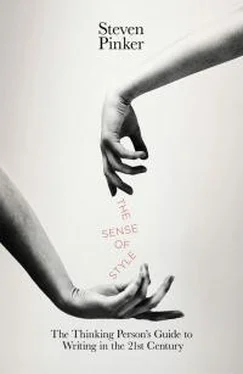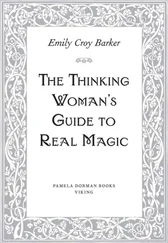Either Elissa or the twins are sure to be there.
Either Elissa or the twins is sure to be there.
Either the twins or Elissa is sure to be there.
Either the twins or Elissa are sure to be there.
You mustn’t go unless either I or your father comes home with you.
You mustn’t go unless either I or your father come home with you.
Either your father or I am going to have to come with you.
Either your father or I is going to have to come with you.
No amount of tree-thinking will help you here. Even the style manuals throw up their hands and suggest that writers just look at the linear order of words in the string and make the verb agree with the noun phrase closest to it, like the versions in the left column. Coordination phrases simply don’t follow the logic of ordinary headed phrases. Writers are well advised to avoid between you and I, since it makes many readers bristle, but it is not a heinous error.
can versus may . This cartoon explains a traditional rule about two common modal auxiliaries:

9 Chickweed Lane © brooke mceldowney. Used by permission of Universal Uclick for Ufs. All rights reserved.
At least Mrs. O’Malley didn’t give the standard grown-up’s answer to a child’s request with can: “You can, but the question is, may you?” A colleague of mine recalls that whenever she said, “Daddy, can I ask you a question?” the response was “You just did, but you may ask me another.”
As the puzzlement of the young man in the cartoon suggests, the traditional distinction between the meaning of can (capability or possibility) and the meaning of may (permissibility) is tenuous at best. Even many sticklers don’t have the courage of their convictions, such as the maven who insisted on the distinction in one entry in his usage guide but slipped up in another entry and ruled that a certain verb “can only be followed by for .” 11(Gotcha! He should have written may. ) Conversely, may is commonly and innocuously used for possibility rather than permission, as in It may rain this afternoon .
In formal style we see a slight preference for using may for permission. But as Mrs. O’Malley suggested, it is only when one is asking (or granting) permission that may is preferable, not when one is merely talking about it. The sentence Students can submit their papers anytime Friday might be said by one student to another, but Students may submit their papers anytime Friday is more likely to be an announcement of the policy by the professor. Since most prose neither grants nor requests permission, the distinction is usually moot, and the two words may (or can) be used more or less interchangeably.
dangling modifiers.Do you see a problem with the sentences that follow?
Checking into the hotel, it was nice to see a few of my old classmates in the lobby.
Turning the corner, the view was quite different.
Born and raised in city apartments, it was always a marvel to me.
In order to contain the epidemic, the area was sealed off.
Considering the hour, it is surprising that he arrived at all.
Looking at the subject dispassionately, what evidence is there for this theory?
In order to start the motor, it is essential that the retroflex cam connecting rod be disengaged.
To summarize, unemployment remains the state’s major economic and social problem.
According to an old rule about “dangling modifiers,” these sentences are ungrammatical. (Sometimes the rule is stated as applying to “dangling participles,” namely the gerund form of a verb ending with – ing or the passive form typically ending in – ed or –en, but the examples include infinitival modifiers as well.) The rule decrees that the implied subject of the modifier (the one doing the checking, turning, and so on) must be identical to the overt subject of the main clause ( it, the view, and so on). Most copy editors would recast the main clause, supplying it with a subject (underlined) to which the modifier can be properly fastened:
Checking into the hotel, I was pleased to see a few of my old classmates in the lobby.
Turning the corner, I saw that the view was quite different.
Born and raised in city apartments, I always found it a marvel.
In order to contain the epidemic, authorities sealed off the area.
Considering the hour, we should be surprised that he arrived at all.
Looking at the subject dispassionately, what evidence do we find for this theory?
In order to start the motor, one should ensure that the retroflex cam connecting rod is disengaged.
To summarize, we see that unemployment remains the state’s major economic and social problem.
Newspaper columns on usage are filled with apologies for “errors” like these, spotted by ombudsmen or managing editors who have trained themselves to flag them. Danglers are extremely common, not just in deadline-pressured journalism but in the works of distinguished authors. Considering how often these forms turn up in edited prose and how readily they are accepted even by careful readers, two conclusions are possible: either dangling modifiers are a particularly insidious grammatical error for which writers must develop sensitive radar, or they are not grammatical errors at all. (Did you notice the dangler in the sentence before last?)
The second conclusion is the right one: some dangling modifiers should be avoided, but they are not grammatical errors. The problem with dangling modifiers is that their subjects are inherently ambiguous and sometimes a sentence will inadvertently attract a reader to the wrong choice. Many style guides reproduce (or contrive) dangling modifiers with unintentionally comical interpretations, such as these ones from Richard Lederer’s Anguished English:
Having killed a man and served four years in prison, I feel that Tom Joad is ripe to get into trouble.
Plunging 1,000 feet into the gorge, we saw Yosemite Falls.
As a baboon who grew up wild in the jungle, I realized that Wiki had special nutritional needs.
Locked in a vault for 50 years, the owner of the jewels has decided to sell them.
When a small boy, a girl is of little interest.
It’s easy—and wrong—to diagnose the problem as a violation of a grammatical rule called subject control. Most verbs that take subjectless complements, such as try in Alice tried to calm down, are governed by an ironclad rule that forces the overt subject to be identical to the missing subject. That is, we have to interpret Alice tried to calm down as “Alice tried to get Alice to calm down,” rather than “Alice tried to get someone to calm down” or “Alice tried to get everyone to calm down.” But with modifiers there is no such rule. The missing subject of a modifier is identified with the protagonist whose point of view we are assuming as we read the sentence, which is often, but need not always be, the grammatical subject of the main clause. The problem is not one of ungrammaticality but of ambiguity, as in the examples we saw in chapter 4. The jewelry owner who was locked in a vault for fifty years is like the panel on sex with four professors and the recommendation of the candidate with no qualifications.
Some so-called danglers are perfectly acceptable. Many participles have turned into prepositions, such as according, allowing, barring, concerning, considering, excepting, excluding, failing, following, given, granted, including, owing, regarding, and respecting, and they don’t need subjects at all. Inserting we find or we see into the main clause to avoid a dangler can make the sentence stuffy and self-conscious. More generally, a modifier can dangle when its implied subject is the writer and the reader, as in To summarize and In order to start the motor in the examples above. And when the subject of the main clause is the dummy element it or there, the reader glides right over it, and it poses no danger of attracting a dangler.
Читать дальше













